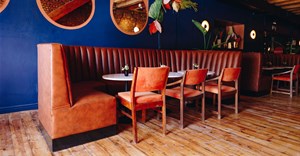
Subscribe & Follow
What to expect at Leopard's Leap's South African Table
But those who truly appreciate food know that it evokes feelings and memories – be it good or bad, happy, or sad – and can also instil new ones.
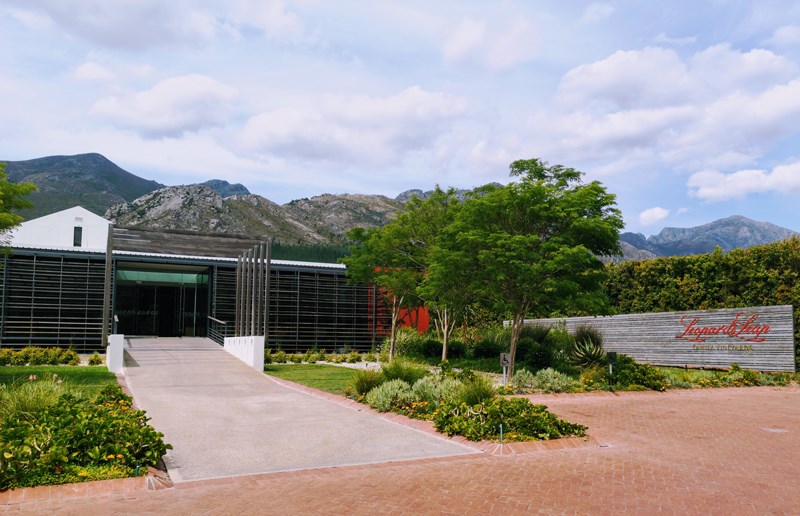
Food is a big part of travel and relationship: once you have shared a local meal with someone in a place other than your hometown, you instantly have a deeper connection. If you don’t believe me, you haven’t tried it.
It goes hand-in-hand with conversations and recollections, delights, and debates. It is something that crosses borders and cultures – even though each place has a unique flavour, and with it, its own stories. Just look at South Africa – a melting pot (for a lack of a better cliche) of culture, cuisine, and traditions and one of the things that make our nation so special.
For the most part, our nation, like the Italians, depends on each region’s strengths and seasonal produce. In Limpopo, you’ll find delicacies such as Mopani worms, dried termites, home-brewed beer, chicken feet and cow heels (talk about ‘zero-waste’ lifestyle!), as well as flame-grilled chicken.
In the Free State, you have a wide choice of meat, cherries, mielies, melktert, mielie bread, pap, pumpkin fritters, kaaings, melkkos, and stews. And don’t forget the witblitz. Danger!

Over on the East Coast, KwaZulu Natal boasts Durban curries, atjar, samoosas, breyani, tandoori, and bunny chow. The Northern Cape is known as the place where lamb, venison and ostrich is king, whereas in the Eastern Cape you’ll eat the yummiest sweet potatoes of your life.
The Western Cape, with its mixture of Asian, African, and European influences, means you’ll taste sweet, sour, salty and spicy: tomato stew, waterblommetjiebredie, West Coast mussels, snoek, pickled fish, crayfish, and the gatsby.
And these are just a few. If you feel I’m talking foreign, Google these dishes and let your life be changed!
Leopard’s Leap Family Vineyards in Franschhoek has decided to celebrate this lekker side of Mzansi with its “South African Table Experience”.
The South African Table Experience welcome
We are welcomed by Chef Christiaan Visser and Leopard’s Leap wine ambassador, Stian Willemse. With the restaurant and wine tasting area buzzing behind us, we are happy as larks around the kitchen table as we have both these knowledgeable guys’ full attention, telling us about food and wine. We love hearing about food and wine and even more so, tasting it.
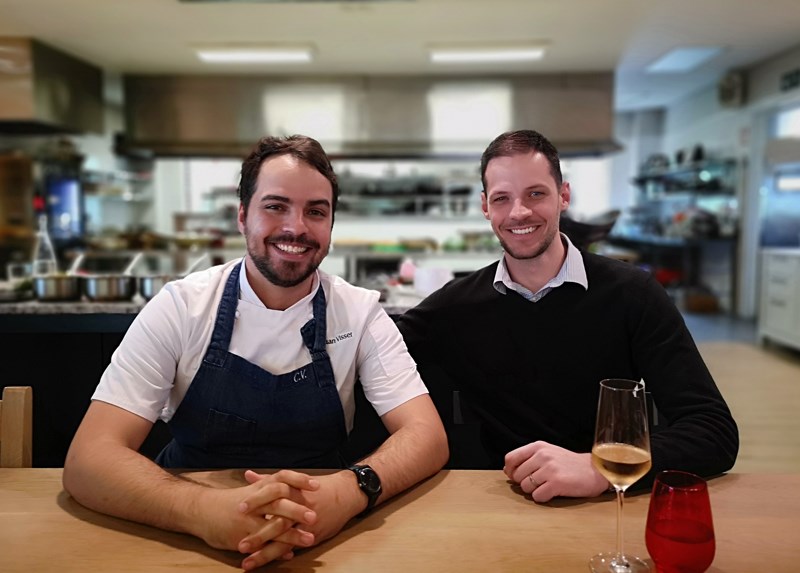
“Coming from Augrabies in the Northern Cape where lamb is king, I just had to add some lamb to your little welcoming snacks,” says Visser as he places our plates before us to enjoy with our welcome bubbly. “Snacks” seems like such an underrated word to accompany this plate.
The pan-fried venison fillet is perfectly cooked and served with dollops of apricot compote. On the side, there is a lamb croquette dusted with red cabbage powder and each bite disappears in my mouth instantly so soft is the meat.
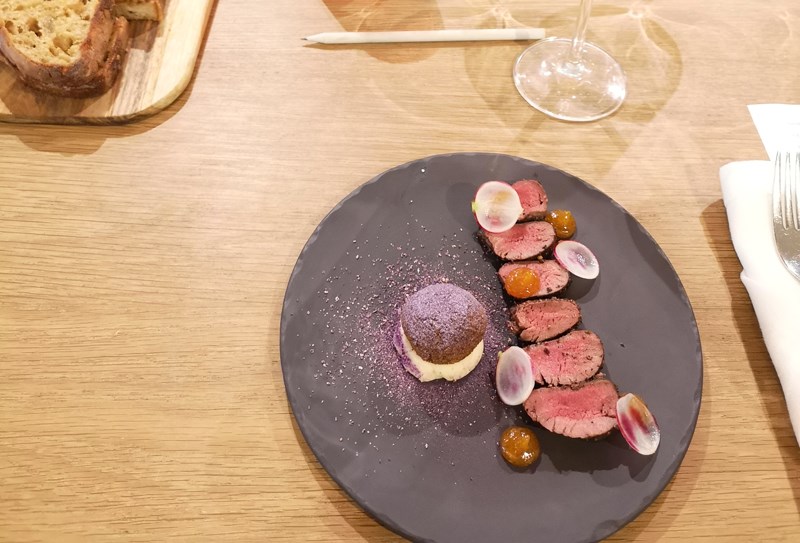
Leopard’s Leap is the youngest farm in the group of Rupert family farms. It doesn’t have any vineyards on the property (but it does steal a vineyard view from sister farm, La Motte) which means it doesn’t make any wine on the farm.
The winemaker's source grapes from other farms in specific areas like the Swartland and Paarl to make the wines their consumers love on a different property. Its biggest market is currently China, who gets one-third of its produce.
Leopard’s Leap instead focusses on three special passions: food, conservation and literature, alongside its primary passion for wine, explains Willemse.
The party starters
As Willemse tells us about the farm, Visser arrives with our starter.
“Deep ingrained in South African food culture,” he says, “is spices.”
He places brightly coloured plates before us: pan-fried hake served with vinegar, turmeric, cardamom, and coriander sauce to highlight the sweet and sour elements of South African cuisine. It is topped with croutons for texture, grilled avo (that resembles our braai culture) for creaminess, apricot atjar, fennel and tomato salsa.
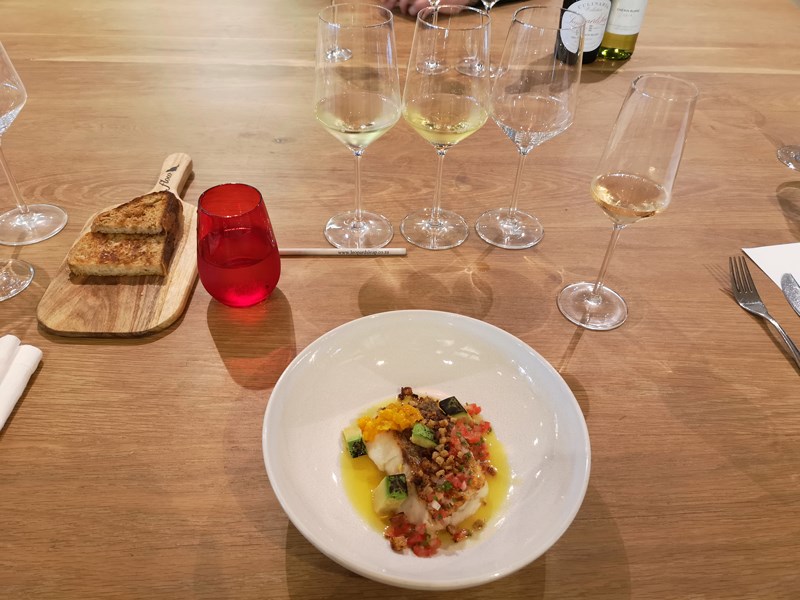
“We have some of the best curries in our country thanks to both Malay and Indian influences. They are definitely different styles of curries and this one leans more towards a Malay curry,” notes Visser.
We lap up this flavour explosion along with Leopard’s Leap’s classic Chenin Blanc (which won the trophy at this year’s Michelangelo International Wine & Spirits Awards for the best Chenin Blanc) and the Culinaria Chenin Blanc which spent nine months in French Oak barrels.
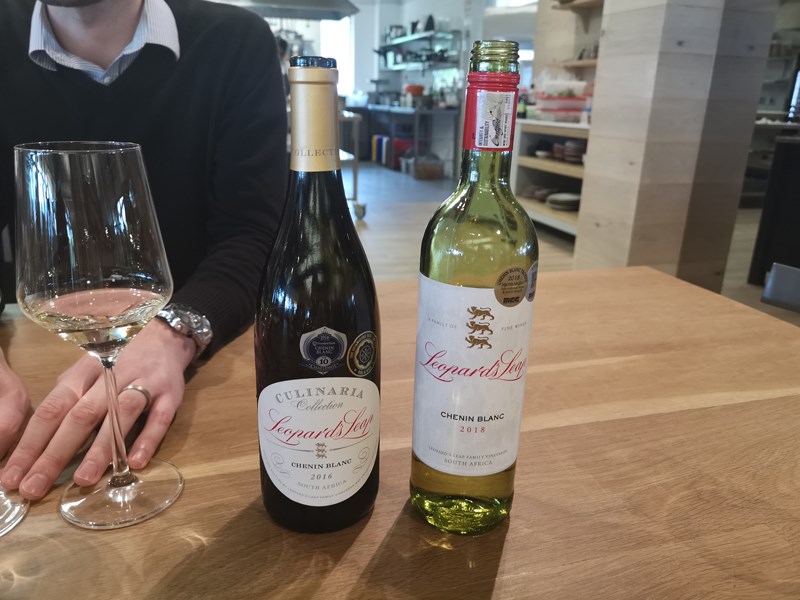
An elegant twist on a mainstream main
For mains, Visser presents the most elegant pap, wors, and smoor plate I have seen in my 30 years on earth. Never in my wildest dreams could I imagine pap and wors looking so larney.
“I thought this is a must since pap is the most consumed starch in South Africa,” he says.
It is served with slappap poffertjies and tomato chutney that he made from scratch. He shows us the recipe in his grandmother’s recipe book that is displayed on the kitchen table. The plate gets some colour from sweet corn puree that he dotted around the edges.
“The wors we make ourselves. It’s only kudu meat and some sheep fat otherwise it’s too dry. Sheep fat is also very flavoursome. The only other things we added were pepper, coriander seeds, cloves, and salt. People can be so fussy when it comes to wors,” he laughs.

Willemse pours each of us a glass of Leopard’s Leap Pinotage 2016, grown in the Swartland. It complements the dish beautifully with flavours of blackberry and white pepper and almost resembles some tastes of a Shiraz.
The South African Table sweet delights
To end off our truly South African Table Experience, we treat our taste buds to Leopard’s Leap’s 2018 Culinaria Muscat and another favourite recipe from Visser’s homeland in Augrabies – brandy tartlets (that are similar to Malva pudding).
We savour the distinct tastes of dates, pecan nuts, brandy, muscadel, custard and grated macadamia nuts and wish the bowl would never empty.
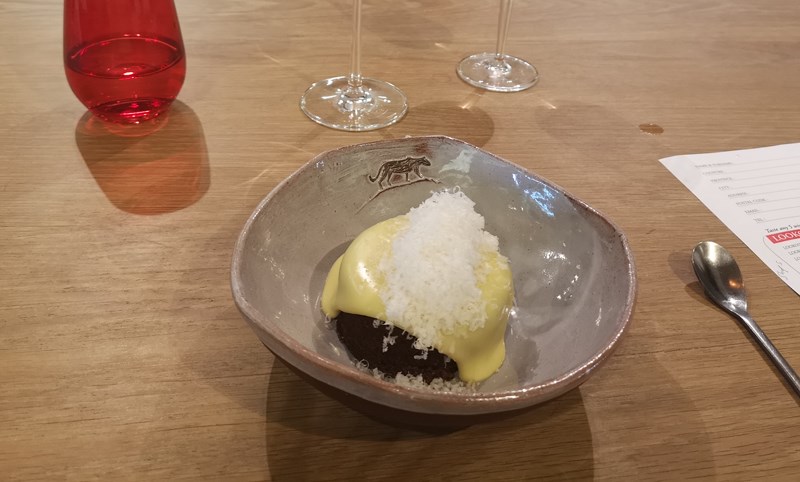
I have always believed what Julia Child said because South Africans love to eat and they are, without a doubt, some of the best people you will ever meet.
The South African Table takes place every Wednesday, Thursday and Saturday from 12pm–1pm at Leopard’s Leap Family Vineyards in Franschhoek. The cost for the South African Table is R335 per person.
Reservations can be made in advance at az.oc.paelsdrapoel@snoitavreser or +27 (0)21 876 8002.










